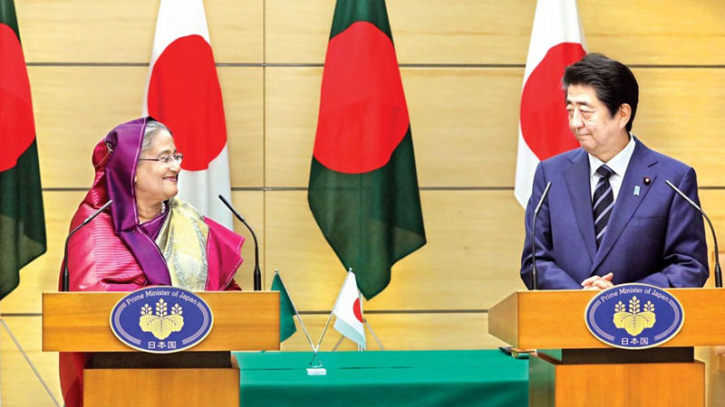The future landscape of Japan-Bangladesh relations in post-LDC graduation

The historical tapestry woven between Japan and Bangladesh is both rich and enduring, standing as a testament to the strength of their developmental partnership. The roots of this relationship delve into cultural exchanges that trace back to literary luminaries like Rabindranath Tagore and Tenshin Okakura in the early 20th century. This bond has not only weathered the passage of time but has evolved into a multifaceted collaboration, with Japan becoming an indispensable force in Bangladesh’s socio-economic development.
Historical Ties and Economic Partnership
Since Bangladesh’s inception, Japan has been a consistent and all-weather friend, contributing an impressive $24.72 billion in development aid. Beyond the realms of cultural exchange, Japan has emerged as Bangladesh’s largest export destination in Asia. The post-Comprehensive Partnership era, initiated in 2014, witnessed a surge in economic collaboration. By May 2023, the presence of 338 Japanese companies in Bangladesh had doubled over a decade, signaling a robust and evolving economic relationship.
As we explore the depths of this economic partnership, it is crucial to understand the symbiotic nature of the collaboration. Japan’s contributions extend beyond financial aid; they have been instrumental in providing technical expertise, knowledge transfer, and capacity building. This holistic approach has not only fueled economic growth but has also nurtured a conducive environment for sustained development.
Economic Partnership Agreement (EPA) and LDC Graduation
Bangladesh, set to graduate from the status of a Least Developed Country (LDC) in 2026, faces a crucial juncture in its economic journey. Recognizing the potential challenges that come with this transition, Japan has taken a proactive step by initiating an Economic Partnership Agreement (EPA). This move marks a historic moment for Japan as it engages in negotiations for such an agreement with a nation on the cusp of shedding its LDC status.
The EPA holds multifaceted significance. At its core, it serves as a proactive mechanism to alleviate the impact of potential tariff losses for Bangladesh. The impending graduation from LDC status would deprive Bangladesh of tariff exemptions from developed nations, making the EPA a crucial instrument to cushion against adverse economic effects. By aiming to finalize the EPA by 2025, both Japan and Bangladesh underline their shared commitment to fostering mutual growth beyond traditional paradigms.
Infrastructure Development and Strategic Cooperation
Japan’s contributions to Bangladesh’s infrastructural development, facilitated through entities like the Japan International Cooperation Agency (JICA), have been instrumental. The funding and technical support from Japan have played a pivotal role in transformative projects such as the Metro Rail and Matarbari Deep Seaport.
These projects not only address immediate infrastructural needs but also lay the groundwork for sustainable development. The transfer of technology, skills, and expertise from Japan to Bangladesh during these collaborations contributes to the latter’s long-term self-sufficiency and growth. The strategic alignment between Japan’s Bay of Bengal Industrial Growth Belt (Big-B) initiative and Bangladesh’s “Look East” policy further enhances the synergies, placing Bangladesh in a strategically advantageous position for economic diversification and regional influence.
The warmth of the Japan-Bangladesh relationship extends beyond economic collaborations, resonating in the hearts and minds of the people. A 2014 Pew Research survey revealed that an overwhelming 71 percent of Bangladeshis hold a favorable view of Japan. This illustrates not just the economic impact but also the positive cultural influence that Japan has had on Bangladesh.
In the fiscal year 2020–21, Japan emerged as the top bilateral donor to Bangladesh, contributing USD 714.44 million. This figure surpasses the combined assistance from the World Bank and Asian Development Bank, underscoring Japan’s crucial role in supporting Bangladesh’s socio-economic development. The financial support not only provides a lifeline for ongoing projects but also solidifies Japan’s commitment to fostering sustainable growth in Bangladesh.
Beyond economics, the collaborative efforts between Japan and Bangladesh delve into strategic geopolitical significance. Bangladesh’s strategic geographic location in the Bay of Bengal offers Japan a crucial vantage point to counterbalance Chinese dominance in the Indian Ocean region. Simultaneously, Japan stands as one of Bangladesh’s most critical global development partners. The substantial financial contributions from Japan reflect a strategic alignment that goes beyond bilateral interests, positioning the relationship within a broader global context.
Future Landscape of Japan-Bangladesh Relations
This strategic alignment is further exemplified by Japan’s Bay of Bengal Industrial Growth Belt (Big-B) initiative and Bangladesh’s proactive “Look East” policy. As these nations collaborate on fostering a rule-based maritime regime and promoting the ideals of the Free and Open Indo-Pacific (FOIP), the partnership takes on a more significant regional and global dimension.
In navigating the future of Japan-Bangladesh relations post-LDC graduation, the landscape appears transformative and promising. Fueled by a shared commitment to economic growth, infrastructural development, and strategic cooperation, these two nations are poised to navigate the complexities of the global stage together. The ongoing negotiations for an Economic Partnership Agreement exemplify a proactive approach to mitigate potential challenges arising from tariff adjustments.
As Bangladesh positions itself as a significant player in the global arena, the deep-rooted ties between these nations continue to evolve, promising a mutually beneficial and enduring partnership for years to come. The collaborative spirit embedded in this relationship stands as a testament to the resilience and adaptability of international partnerships in the face of changing global dynamics. As the Japan-Bangladesh story unfolds, it carries the promise of not just economic prosperity but also cultural enrichment, regional stability, and a shared vision for a more interconnected and harmonious world.
.png)




